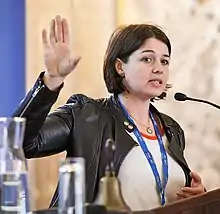Rosalind Coggon
Rosalind Mary Coggon is an English scientist who is a Royal Society University Research Fellow at the University of Southampton. She is the co-editor of the 2050 Science Framework, which guides multidisciplinary subseafloor research. She was awarded the 2021 American Geophysical Union Asahiko Taira International Scientific Ocean Drilling Research Prize.
Rosalind Mary Coggon | |
|---|---|
 Coggon receiving 2020 award from the European Consortium for Ocean Research Drilling | |
| Alma mater | University of Cambridge University of Southampton |
| Scientific career | |
| Institutions | Imperial College London University of Michigan University of Southampton |
| Thesis | Hydrothermal alteration of the ocean crust : insights from the Macquarie Island and drilled in situ ocean crust (2006) |
Early life and education
Coggon was an undergraduate student at the University of Cambridge, where she studied natural sciences.[1] She moved to the University of Southampton as a doctoral researcher in 2001.[1] Her research considered hydrothermal alteration of ocean crust on Macquarie Island. Her doctoral research involved field work on Macquarie as part of the Australian National Antarctic Research Expeditions (ANARE).[2] After graduating she was made a postdoctoral research scientist at the University of Michigan.[1] She returned to the United Kingdom in 2007, where she was appointed a postdoctoral researcher at Imperial College London.[1][3] By studying the calcium carbonate veins that form in rocks beneath the seafloor, Coggon showed that the chemical composition of oceans varied considerably over geological time.[4][5]
Research and career
In 2010, Coggon was awarded a Royal Society Dorothy Hodgkin Fellowship and she moved to the University of Southampton. She was made a Royal Society University Research Fellow in 2018.[1] Her research considers the role of fluids in the evolution of the ocean crust, and the quantification of chemical exchanges between the ageing crust and the overlying oceans.[1][6]
Coggon is co-editor of the International Ocean Discovery Program 2050 Science Framework: Exploring Earth by Scientific Ocean Drilling,[7][8] which guides multidisciplinary subseafloor research. The framework identifies research frontiers that can only be achieved through ocean drilling. It has a thirty-year outlook and looks to achieve state-of-the-art scientific ocean drilling into the mid-21st century.
Coggon was awarded the Asahiko Taira International Scientific Ocean Drilling Research Prize in 2021.[9] The prize, which honours contributions to scientific ocean drilling, is given in partnership between the American Geophysical Union and Japan Geoscience Union.
Selected publications
- R. Coggon; T. J. B. Holland (September 2002). "Mixing properties of phengitic micas and revised garnet-phengite thermobarometers". Journal of Metamorphic Geology. 20 (7): 683–696. Bibcode:2002JMetG..20..683C. doi:10.1046/J.1525-1314.2002.00395.X. ISSN 0263-4929. Wikidata Q61828880.
- Rosalind M Coggon; Damon A H Teagle; Christopher E Smith-Duque; Jeffrey C Alt; Matthew J Cooper (4 February 2010). "Reconstructing past seawater Mg/Ca and Sr/Ca from mid-ocean ridge flank calcium carbonate veins". Science. 327 (5969): 1114–1117. Bibcode:2010Sci...327.1114C. doi:10.1126/SCIENCE.1182252. ISSN 0036-8075. PMID 20133522. Wikidata Q43172629.
- Douglas S Wilson; Damon A H Teagle; Jeffrey C Alt; et al. (20 April 2006). "Drilling to gabbro in intact ocean crust". Science. 312 (5776): 1016–1020. Bibcode:2006Sci...312.1016W. doi:10.1126/SCIENCE.1126090. ISSN 0036-8075. PMID 16627698. Wikidata Q46364794.
References
- "Dr Rosalind Coggon | Southampton Marine and Maritime Institute | University of Southampton". www.southampton.ac.uk. Retrieved 30 December 2021.
- "Dr Rosalind Coggon Awarded from the American Geophysical Union | Ocean and Earth Science, National Oceanography Centre Southampton | University of Southampton". www.southampton.ac.uk. Retrieved 30 December 2021.
- "Dr. Rosalind Coggon | Carbonate Research". carbonateresearch.org. Retrieved 30 December 2021.
- "Carbonate veins reveal chemistry of ancient seawater". EurekAlert!. Retrieved 30 December 2021.
- "New technique for analysing the chemistry of ancient oceans could reveal facts about early Earth | Imperial News | Imperial College London". Imperial News. Retrieved 30 December 2021.
- "6th ECORD Award: Roz Coggon". ECORD: European Consortium for Ocean Research Drilling. 8 January 2021. Retrieved 30 December 2021.
- "2050 Science Framework | Post-IODP Planning | IODP". www.iodp.org. Retrieved 30 December 2021.
- "2050 Science Framework: Exploring Earth By Scientific Ocean Drilling". ECORD: European Consortium for Ocean Research Drilling. 27 October 2020. Retrieved 30 December 2021.
- "The Asahiko Taira International Scientific Ocean Drilling Research Prize | AGU". www.agu.org. Retrieved 30 December 2021.